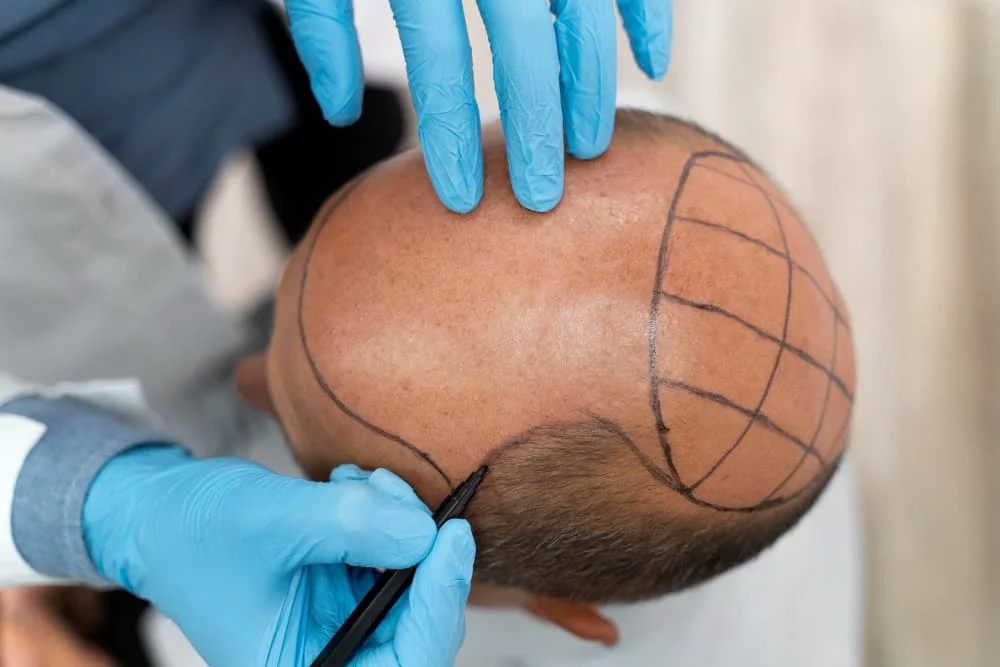
Hair loss is a common issue faced by both men and women. Fortunately, with advancements in hair transplant technology, there are now permanent and natural solutions available for many people experiencing hair loss. However, not everyone is suitable for these procedures; certain criteria must be met to ensure the success of a hair transplant.
In this article, we’ll discuss the five main signs that can help determine whether you are a good candidate for a hair transplant. These include the type of hair loss, the stage of hair loss, and the density of hair in the donor area, among other critical factors. By considering these factors, you can better evaluate whether a hair transplant is the right choice for you.
1. Type and Cause of Your Hair Loss
Before undergoing a hair transplant, it is crucial to understand the type of hair loss you are experiencing and the underlying causes. Hair loss can result from different factors, and not every type responds the same way to a transplant.
Genetic Hair Loss (Androgenetic Alopecia)
Genetic factors and hormones are the primary causes of androgenetic alopecia, the most common type of hair loss in both men and women. In men, it often manifests as a receding hairline and thinning at the crown, whereas in women, it typically appears as overall hair thinning. Those experiencing genetic hair loss are often excellent candidates for hair transplants, which tend to yield successful results for this type of hair loss.
Other Types of Hair Loss
Aside from genetic hair loss, there are other types that may or may not be suitable for a transplant:
- Alopecia Areata: This condition occurs when the immune system attacks hair follicles, causing patchy hair loss. Treating this type can be challenging, and hair transplantation might not always provide a permanent or effective solution.
- Cicatricial Alopecia: Also known as scarring alopecia, this condition results in permanent damage to the follicles and the formation of scar tissue. Hair transplantation is usually not a viable option, as newly transplanted follicles may not survive in scarred areas.
- Traction Alopecia: This is caused by constant pulling on the hair or tight hairstyles. Hair transplantation can be effective in such cases, but it is essential to avoid tight hairstyles after the procedure to prevent recurrence.
Determining whether you are a suitable candidate for a hair transplant starts with accurately diagnosing the type and cause of your hair loss. Consulting a doctor for a personalized evaluation is therefore highly recommended.
2. Stage of Hair Loss
The stage of your hair loss plays a critical role in determining whether you are a suitable candidate for a hair transplant. Hair loss progresses in stages, and understanding these stages helps predict how successful the transplant can be. Hair transplants are generally more effective during the earlier stages of hair loss.
Common tools used to determine the stage of hair loss include the Norwood Scale (for men) and the Ludwig Scale (for women). These classification systems evaluate the severity and pattern of hair loss, aiding in assessing a person’s suitability for transplantation.
- Norwood Scale: The Norwood Scale classifies male pattern hair loss into seven stages. The first stage involves a minor recession of the hairline, while the last stage shows almost complete hair loss at the crown and front.
- Ludwig Scale: The Ludwig Scale categorizes female pattern hair loss into three stages. The first stage involves general thinning, while the final stage shows significant thinning at the crown.

Suitable Stages for Transplantation
Hair transplants are most effective for individuals at stages 3-5 on the Norwood Scale and stages 1-2 on the Ludwig Scale. At these stages, hair loss is not too advanced, making it easier to achieve natural and successful results. However, at later stages, hair transplantation alone may not suffice, and other treatment options may need to be combined with the procedure.
Consulting a doctor to evaluate the stage of your hair loss and treatment options is beneficial. Your doctor can determine your hair loss pattern and severity, then create the most suitable treatment plan for you.
3. Density and Quality of Hair in the Donor Area
In hair transplantation, grafts are typically harvested from the back and sides of the head (the donor area) to be implanted into bald or thinning areas. Therefore, being a suitable candidate depends on having sufficient and good-quality hair follicles in the donor area.
Hair Density in the Donor Area
The density of the donor area determines how many grafts can be harvested and how extensively they can be transplanted. If the donor area is dense, more grafts can be obtained, allowing for a wider transplantation area, thus enhancing both the success and natural appearance of the procedure.
Quality of Hair and Transplant Success
The quality of hair in the donor area is another crucial factor affecting the success of the transplant. Thick, healthy, and pigmented hair follicles yield better results in the transplanted area. The thickness, color, and curliness of your hair also influence the outcome of the procedure, with good-quality follicles providing a fuller and more natural look.
Doctor’s Evaluation
Your doctor will evaluate the density and quality of your donor area before the hair transplant. A hair analysis will be conducted to assess the density, thickness, and quality of your follicles, determining whether you are a suitable candidate for the procedure. If there is insufficient density or quality in the donor area, hair transplantation may not be ideal for you, and your doctor will suggest alternative treatments.
In conclusion, the density and quality of the donor area are crucial for a successful transplant, and a thorough expert evaluation before the procedure is essential.
4. The Importance of Your Overall Health
Since hair transplantation is a surgical procedure, having good general health is crucial. Certain health conditions or medications can affect the safety of the operation and the healing process.
Chronic Conditions and Medication Use
If you have chronic health conditions like diabetes, hypertension, or heart disease, or if you take blood thinners or other regular medications, you must inform your doctor. Your doctor will thoroughly assess your health status to determine if you are a suitable candidate for a hair transplant.
Situations That Are Not Suitable for Hair Transplant
Hair transplantation is not recommended in some health conditions, including:
- Bleeding Disorders: People with bleeding disorders like hemophilia face a high risk of bleeding during and after the procedure.
- Uncontrolled Diabetes: Diabetes can delay wound healing and increase the risk of infection.
- Weak Immune System: A weakened immune system increases the risk of infection, which can lead to complications.
- Active Skin Infections: If you have an active scalp infection, transplantation cannot proceed until the infection has healed.
- Keloid Formation Tendency: Those prone to keloid formation have a risk of excessive scar tissue developing after transplantation, leading to undesirable cosmetic results.
Ultimately, if you are considering hair transplantation, discussing your overall health status and expectations with your doctor is crucial. This way, you can determine the most suitable treatment for you and ensure a healthier process.
5. Your Expectations from the Hair Transplant

Hair transplantation is a procedure that requires advanced technology and expertise. A successful operation can help you regain lost hair and boost your confidence. However, before embarking on this journey, it is essential to have realistic expectations about hair transplantation and understand the limitations of the procedure.
Every hair follicle is different, and unfortunately, there is no guarantee that every transplanted follicle will survive. The results of a hair transplant are influenced by several factors, including post-operative care, genetics, and lifestyle. Similarly, hair transplantation does not stop existing hair loss entirely. For those experiencing genetic hair loss, hair in untreated areas may continue to thin over time.
While hair transplantation is not a miracle solution, it can deliver very satisfactory and successful results with proper expectations and planning. Therefore, if you are considering a hair transplant, consulting with a doctor for a personalized evaluation is essential. This will help you better understand the limits of the procedure and clarify your expectations, enabling you to make a more informed and healthy decision.
Recent Posts
-
 Donor Area in Hair Transplant: All You Need to Know - Istanbul Hair Institute06 Jan 2025
Donor Area in Hair Transplant: All You Need to Know - Istanbul Hair Institute06 Jan 2025 -
 The Connection Between Oral Health and Overall Health03 Jan 2025
The Connection Between Oral Health and Overall Health03 Jan 2025 -
 The Role of Antioxidants in Skincare: How to Protect and Repair Skin03 Jan 2025
The Role of Antioxidants in Skincare: How to Protect and Repair Skin03 Jan 2025 -
 What to Expect in the First Week After a Hair Transplant03 Jan 2025
What to Expect in the First Week After a Hair Transplant03 Jan 2025 - Rosemary Oil for Hair Loss: Myth or Reality?27 Dec 2024


